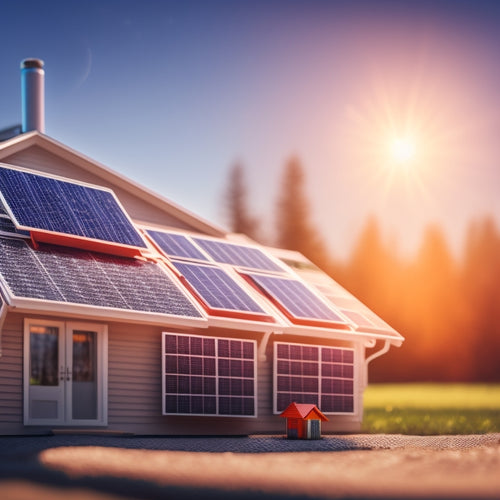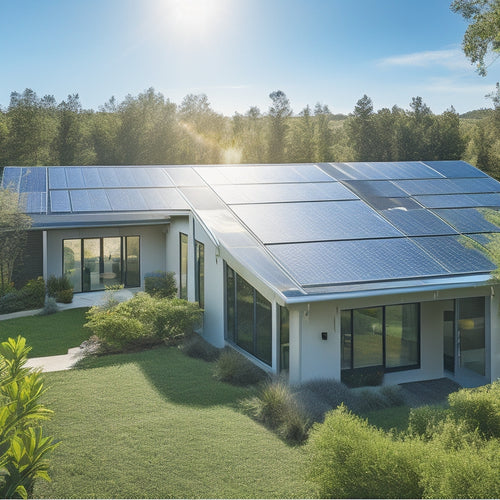
Off Grid Cabin Solar Kit
Share
You're considering an off-grid cabin solar kit, a smart move towards energy independence. With a typical solar panel system, you can save $400 to $1,000 annually on electricity bills. By evaluating your energy requirements, you'll determine the right kit size for your needs. High-efficiency monocrystalline solar panels and advanced battery management will guarantee a reliable power supply. As you investigate off-grid solar systems, you'll find the benefits of a zero carbon footprint, increased home value, and efficient energy consumption. Now that you've started down this path, you're likely to reveal even more advantages as you tailor a solar kit to your unique needs.
The Essentials
- Determine your cabin's daily energy usage to size the solar kit appropriately, considering appliances and usage patterns.
- High-efficiency monocrystalline solar panels with high-quality materials ensure reliable energy and extended lifespan.
- Combining solar power with energy-efficient practices and battery storage enables energy independence and lowers utility bills.
- A well-designed off-grid solar kit can save you $400 to $1,000 annually on electricity and increase your cabin's value.
- Proper installation, orientation, and maintenance of solar panels and batteries ensure consistent power supply and minimize carbon footprint.
Renewable Energy Saves Money
You'll reduce your energy costs considerably by utilizing renewable energy from the sun, which translates to lower utility bills over time.
By investing in solar power and battery storage solutions, you'll not only save money but also gain energy independence.
With a solar kit, you'll generate free energy during the day, reducing your reliance on the grid and saving you money on your electricity bills.
Energy Cost Reduction
As you shift to off-grid living, utilizing renewable energy becomes an essential aspect of reducing your reliance on traditional power sources, and subsequently, your energy expenditures.
By investing in a solar kit, you'll reap considerable solar investment benefits, including reduced energy costs. This shift to a sustainable lifestyle choice allows you to break free from the constraints of traditional power grids and enjoy the financial freedom that comes with it.
Additionally, rooftop solar panels can increase your home's value and appeal, making it a more attractive selling point should you decide to move solar panel installation for homes.
Renewable energy systems, like solar power, offer a clean and efficient way to generate electricity. By capturing the sun's energy, you can notably reduce your energy costs.
According to the US Department of Energy, a typical solar panel system can save homeowners between $400 and $1,000 per year on their electricity bills. This translates to a considerable reduction in your energy expenditures, allowing you to allocate resources to other essential aspects of your off-grid lifestyle.
Save on Utility Bills
Since adopting renewable energy sources like solar power, many off-grid homeowners have greatly slashed their utility bills. By utilizing free energy from the sun, you can greatly reduce your reliance on traditional power grids and lower your energy expenses.
Conducting a utility bill analysis helps identify areas of inefficiency and opportunities for improvement. With solar power, you can offset a substantial portion of your energy consumption, leading to considerable savings. As the concern for the environment and energy efficiency continues to grow, many homeowners and businesses are turning to Renewable Power Solutions as a solution.
This shift towards eco-friendly technology not only benefits the environment but also leads to considerable cost savings.
To maximize your energy savings, consider implementing energy-saving tips such as optimizing your energy usage during peak sunlight hours, using energy-efficient appliances, and insulating your cabin to reduce heat loss.
By combining these strategies with solar power, you can enjoy considerable reductions in your utility bills. As you save money on energy costs, you'll have more freedom to invest in your off-grid lifestyle, pursue your passions, and live life on your own terms.
Zero Carbon Footprint
You're likely considering an off-grid cabin solar kit to achieve a zero carbon footprint, which means you'll need to balance your energy consumption with your energy production.
By investing in a complete solar power system, including solar panels, energy storage batteries, and inverters, you can guarantee a reliable and efficient energy supply renewable energy solutions.
Carbon neutral living is possible when you combine energy efficiency with a renewable energy source, like solar power.
Carbon Neutral Living
One essential aspect of off-grid living is embracing carbon neutral living, which involves minimizing your reliance on fossil fuels and reducing your carbon footprint to zero. You can achieve this by incorporating sustainable practices into your daily life. This includes reducing energy consumption, using eco-friendly materials, and adopting environmentally responsible habits.
Here's a breakdown of some key considerations for carbon neutral living:
| Aspect | Action |
|---|---|
| Energy Efficiency | Install energy-efficient appliances and lighting |
| Water Conservation | Implement rainwater harvesting and greywater reuse |
| Waste Management | Implement recycling and composting programs |
| Transportation | Use electric or hybrid vehicles, or opt for walking/cycling |
| Building Materials | Choose eco-friendly materials for construction and renovation |
Renewable Energy Source
Utilizing renewable energy sources is vital in achieving a zero-carbon footprint, as it enables you to generate power sustainably and reduce your reliance on fossil fuels. By utilizing solar energy, you can tap into a clean and abundant resource that reduces your carbon emissions and contributes to sustainable living.
When you opt for solar energy, you reap several benefits. For instance, solar panels require minimal maintenance, and their lifespan can extend up to 30 years or more. Additionally, solar energy is cost-effective in the long run, as you save on energy bills and reduce your dependence on the grid.
Furthermore, solar energy benefits the environment by reducing greenhouse gas emissions and mitigating climate change.
In your off-grid cabin, a solar kit can be a reliable and efficient source of renewable energy. By integrating solar panels with a battery bank and an inverter, you can store excess energy generated during the day for use at night or during periods of low sunlight.
This setup enables you to live off the grid while enjoying the comforts of modern life.
High-Efficiency Monocrystalline Solar Panels
You'll want to evaluate high-efficiency monocrystalline solar panels that boast an impressive panel efficiency rating, typically ranging from 20% to 22%.
These panels are ideal for remote cabins and off-grid solar systems where energy reliability is vital.
They're built to last, ensuring durability in harsh conditions, including extreme temperatures, humidity, and weather events.
Panel Efficiency Rating
Your off-grid cabin's solar kit relies heavily on the efficiency of its solar panels, which is where high-efficiency monocrystalline solar panels come into play.
These panels boast an impressive efficiency rating, typically ranging from 20% to 23%. This means they can convert a higher percentage of sunlight into usable electricity, making them ideal for off-grid applications.
When selecting high-efficiency monocrystalline solar panels, you'll notice different panel types, each with its own efficiency rating. For instance, PERC (Passivated Emitter and Rear Cell) panels offer higher efficiency than standard monocrystalline panels.
It's crucial to take into account factors like panel size, wattage, and installation tips to maximize energy output. Proper installation, including best tilt and orientation, can further enhance efficiency.
Durability in Harsh Conditions
High-efficiency monocrystalline solar panels are often subjected to harsh environmental conditions, including extreme temperatures, heavy snowfall, and intense UV radiation, which can considerably impact their performance and longevity.
When you're living off the grid, you need a solar kit that can withstand the elements. That's why you should look for panels with exceptional weather resistance.
You'll want to verify the panels are built with high-quality materials that can resist corrosion, cracking, and fading. The frame should be sturdy and anodized to prevent rust, while the glass or plastic covering should be scratch-resistant and able to withstand hail and debris.
The junction box and connectors should also be sealed to prevent water ingress.
A durable solar panel will maintain its efficiency rating over time, even in harsh conditions. This means you can rely on your off-grid cabin solar kit to provide consistent power, regardless of the weather.
Assess Your Energy Requirements
You'll need to determine your daily energy usage to properly size your off-grid cabin solar kit. This involves calculating the total power required to run your appliances, including lights, refrigerators, and computers.
With a reliable backup power solution, such as a lithium-ion battery system, you can guarantee a steady supply of energy during outages.
Start by making a list of the appliances you plan to use, along with their respective power needs in watts.
Daily Energy Usage
Evaluating daily energy usage is an essential step in determining the size of the solar kit required for your off-grid cabin, as it directly impacts the system's overall performance and cost-effectiveness. To assess your energy requirements, you need to understand your usage patterns and identify areas where you can optimize energy consumption.
| Time of Day | Energy Consumption (Wh) | Devices/ Appliances |
|---|---|---|
| Morning (6am-9am) | 300 | Lights, fridge, coffee maker |
| Daytime (9am-5pm) | 800 | Computers, lights, fridge, ventilation |
| Evening (5pm-10pm) | 600 | Lights, TV, fridge, cooking |
| Nighttime (10pm-6am) | 200 | Lights, fridge, security system |
| Total | 1900 |
Appliance Power Needs
To accurately size your off-grid cabin's solar kit, it's vital to determine the power needs of each appliance, considering their individual wattage ratings and usage patterns. You'll need to evaluate the energy consumption of each device to guarantee your solar kit can meet the total energy demand.
Start by making a list of all the appliances you plan to power, including lights, refrigerators, laptops, and medical equipment. For each appliance, note its wattage rating, usually found on the device or in the user manual.
Calculate the total wattage by adding up the individual ratings. Next, consider the usage patterns of each appliance, including the number of hours it will be used daily. This will help you determine the total daily energy consumption in watt-hours (Wh).
When selecting appliances, verify they're compatible with your solar kit's voltage and power output. Look for energy-efficient appliances with low wattage ratings to minimize energy consumption.
Longer System Lifespan Guaranteed
You'll want to guarantee your off-grid cabin solar kit lasts for years to come, and a vital aspect of that's extended battery life.
By choosing high-quality batteries and implementing proper maintenance, you can greatly prolong their lifespan.
This means you'll enjoy a reliable source of energy for your cabin while minimizing replacement costs and reducing waste.
Extended Battery Life
This off-grid cabin solar kit's advanced battery management system secures extended battery life, guaranteeing a longer system lifespan.
You'll enjoy a worry-free experience, knowing your energy storage system is optimized for maximum performance and reliability. The system's intelligent monitoring and control capabilities ascertain precise battery maintenance, preventing undercharging and overcharging that can reduce battery lifespan.
With this advanced technology, you can expect a significant increase in battery life, allowing you to store more energy and reduce the frequency of replacements.
This means you'll have a consistent and reliable source of power, even during extended periods of low sunlight or high energy demand. The system's advanced algorithms and real-time monitoring capabilities work together to optimize energy storage, making certain you have the power you need when you need it.
Frequently Asked Questions
Can I Install the Solar Kit Myself or Do I Need a Professional?
You're considering DIY installation, but it's vital to assess your electrical knowledge; if you're uncertain, it's suggested to seek professional assistance to guarantee a safe and efficient setup that meets your energy needs.
How Do I Maintain and Clean the Solar Panels Regularly?
You'll guarantee peak energy output by performing regular solar panel maintenance, using cleaning techniques like gentle water spray and soft-bristle brushes to remove debris, and scheduling bi-annual inspections to identify potential issues before they impact performance.
Are the Solar Panels Resistant to Extreme Weather Conditions?
You'll be relieved to know that high-quality solar panels are designed to withstand extreme weather conditions, boasting impressive durability and performance in harsh environments, ensuring your energy independence isn't compromised by Mother Nature's fury.
Can I Add More Solar Panels to the Kit in the Future?
You can easily scale up your solar panel expansion to meet future energy needs by adding more panels, ensuring your system remains adaptable and efficient, and giving you the freedom to live off-grid without worrying about energy limitations.
Is the Solar Kit Compatible With My Existing Electrical System?
You're wondering if your existing electrical system is compatible with this new solar solution. First, you'll need to assess your system requirements and energy needs.
Final Thoughts
As you flip the switch, the lights flicker to life, powered by the silence of the sun. Your off-grid cabin solar kit is more than just a means to an end - it's a symbol of independence, shining bright in the wilderness. With a zero-carbon footprint, you're not just saving money, you're investing in a cleaner tomorrow. The high-efficiency monocrystalline solar panels are a wise decision, ensuring a longer system lifespan and a brighter future.
Related Posts
-

A Beginner's Guide to Navigating the Solar Investment Tax Credit
You're eligible to claim a significant Solar Investment Tax Credit (ITC) of 30% of total installation costs, but mane...
-

Designing a Green Roof for Maximum Energy Efficiency
Designing a green roof for maximum energy efficiency involves several key strategies. Start by selecting native, drou...
-

Installing Metal Solar Roofs for Maximum Energy Efficiency
Installing metal solar roofs can drastically enhance your home's energy efficiency and durability. These roofs withst...


